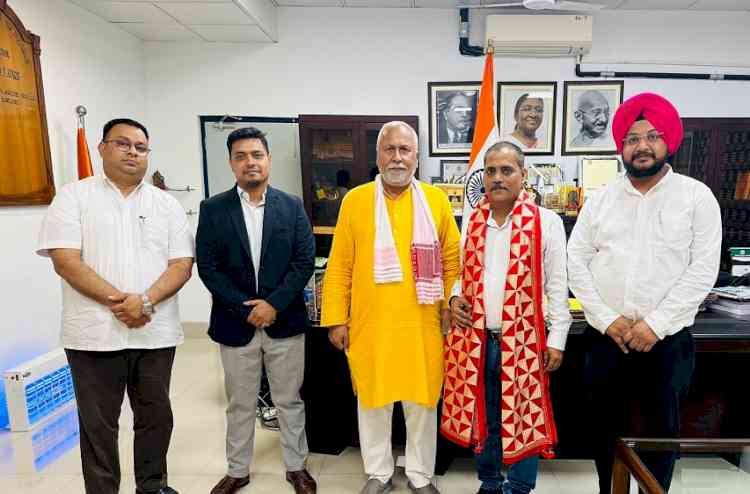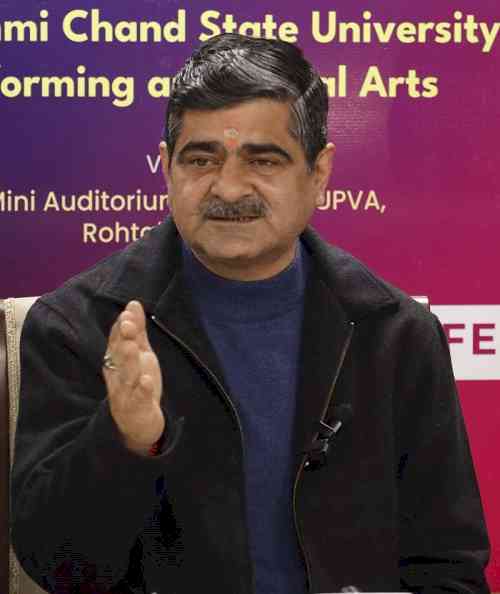CU Punjab Hosts Special Talk on “Foreign Media Narrative and Fake News”
The Department of Mass Communication and Media Studies (MCMS) at the Central University of Punjab (CU Punjab), under the patronage of Vice-Chancellor Prof. Raghavendra P. Tiwari, organized a special talk on “Foreign Media Narrative and Fake News.”

Bathinda, August 11, 2025: The Department of Mass Communication and Media Studies (MCMS) at the Central University of Punjab (CU Punjab), under the patronage of Vice-Chancellor Prof. Raghavendra P. Tiwari, organized a special talk on “Foreign Media Narrative and Fake News.”
The session featured eminent journalists Nagarjuna, Assistant Editor, Panchjanya, New Delhi, and Ravi Mishra, Assistant Editor, Organiser, New Delhi, who shared valuable insights on the influence of foreign media and the challenge of misinformation.
Prior to the programme, Vice-Chancellor Prof. Tiwari felicitated the speakers and reiterated the University’s commitment to aligning research themes with the national vision. He noted that such initiatives are vital in sensitising youth on the strategic implications of foreign media narratives and fake news.
Addressing faculty, research scholars, and students, Ravi Mishra shed light on the growing menace of fake news in the digital era, highlighting that misinformation is often amplified by both foreign and domestic platforms to shape public opinion. Using examples from recent global and national events, he explained how selective reporting, half-truths, and context omission are employed to distort reality. He encouraged students to harness digital tools for fact-checking and to contribute to building a responsible and truthful media ecosystem rooted in Indian ethos.
Nagarjuna examined how foreign media narratives are often shaped by ideological biases and geopolitical interests, citing the example of Operation Sindoor. He explained that prominent outlets such as BBC, CNN, Reuters, and The New York Times shifted focus from the April 22 Pahalgam terror massacre to framing India’s calibrated counter-terror response as an act of “escalation” or “regional tension.” This, he said, downplayed the civilian tragedy and inverted victim-perpetrator roles. He stressed that such editorial framing reflects a deeper pattern—labelling terrorists as “militants” and presenting state action under international law as provocative—thus creating false moral equivalence.
In his welcome remarks, Dr. Rubal Kanozia, Associate Professor and Head of the Department of MCMS, and a noted scholar on foreign media narratives and fake news, underscored the urgency of addressing perception warfare in the 21st century. Highlighting the department’s commitment to equipping students with skills to counter biased narratives through credible and ethical journalism, he stated, “Narrative sovereignty is as vital as territorial sovereignty, and we must prepare our students to counter misinformation with factual, value-based storytelling.”
Towards the end, Dr. Kinshuk Pathak, Associate Professor, expressed gratitude to the speakers for highlighting how perception warfare can influence international legitimacy. Dr. M. Aleem Khan conducted the proceedings.
On this occasion, esteemed faculty members from other departments, including Prof. Vipan Pal Singh from the Department of English and Dr. Deepak Pandey from the Department of Hindi, were present. Faculty from the Department of MCMS, including Dr. Chhavi Garg and Dr. A. Vishnu Memon, also attended, along with research scholars and students who actively participated in the discussion.
The talk not only exposed the layers of bias and manipulation in foreign media narratives but also provided practical approaches for countering misinformation.



 City Air News
City Air News 










